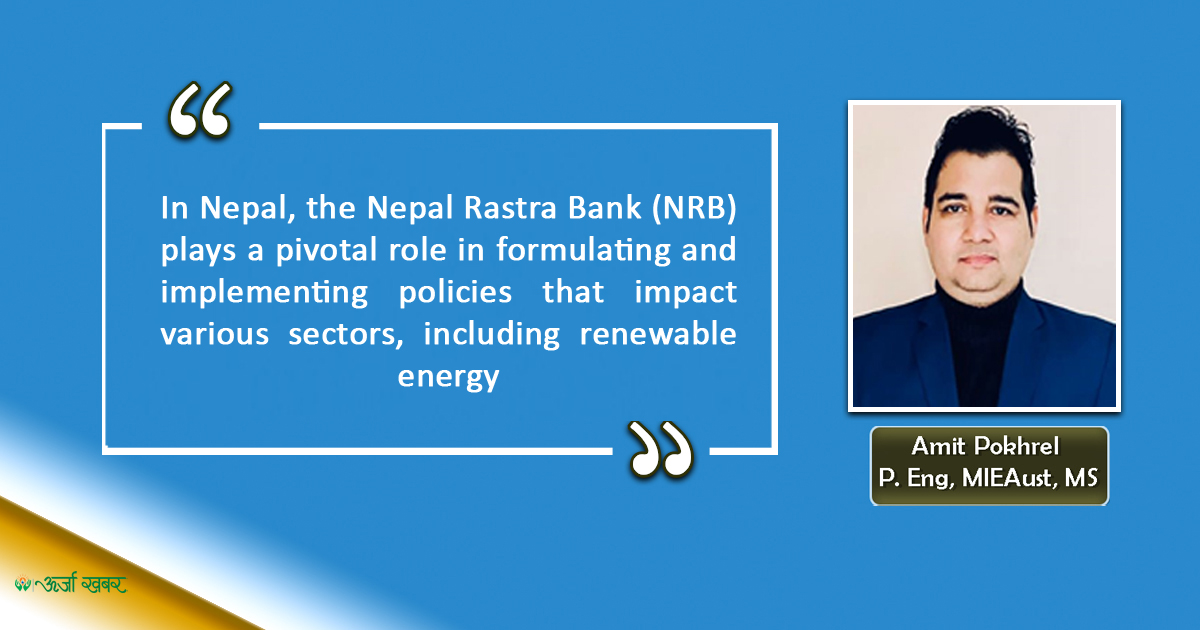
There has been a growing recognition of the need to transition towards renewable energy sources in order to combat climate change and ensure sustainable development. In recent years, Nepal has made significant strides in harnessing renewable energy sources to meet its growing energy demands. From hydroelectric power to solar and wind energy, the country has been exploring various avenues to reduce its dependence on fossil fuels and promote sustainable development. However, one key factor that often determines the success of renewable energy projects is the support and guidance provided by central bank policies. But do central bank policies in Nepal truly support investment in renewable energy?
Before we analyze the impact of central bank policies on renewable energy investment in Nepal, it's essential to understand the role of central banks in shaping the country's economic landscape. Central banks are responsible for overseeing monetary policies, regulating financial institutions, and maintaining overall economic stability. In Nepal, the Nepal Rastra Bank (NRB) plays a pivotal role in formulating and implementing policies that impact various sectors, including renewable energy.

Investing in renewable energy is crucial for Nepal for several reasons. Firstly, it can help reduce the country's dependence on imported fossil fuels, thereby enhancing energy security. Secondly, it can help mitigate the adverse impacts of climate change by reducing greenhouse gas emissions. Thirdly, it can create new employment opportunities and stimulate economic growth. Finally, investing in renewable energy can help increase access to clean and affordable energy for all, especially in remote and rural areas.
Central bank policies can significantly influence investment decisions in the renewable energy sector. By providing incentives, favorable interest rates, and loan guarantees, central banks can encourage businesses and investors to allocate resources towards renewable energy projects. This support is particularly crucial in a developing country like Nepal, where financial constraints often pose a significant barrier to renewable energy development.

There are additional ways in which the central bank can support investment in renewable energy in Nepal. One of the most effective measures is the provision of low-interest loans and financial incentives for renewable energy projects. By offering favorable terms to investors, the central bank can help reduce the upfront costs and risks associated with such projects. Additionally, the central bank can introduce regulatory frameworks that promote renewable energy development, such as feed-in tariffs and net metering policies.
Several factors influence the feasibility and success of renewable energy projects in Nepal. These include regulatory frameworks, government subsidies, technological advancements, and most importantly, access to affordable financing. Central bank policies that facilitate access to finance can play a vital role in attracting investment and driving innovation in the renewable energy sector.
When it comes to renewable energy investment in Nepal, the role of central bank policies cannot be overlooked. The NRB has taken various initiatives to promote sustainable development and encourage investment in renewable energy projects. These initiatives include:
a) Providing concessional loans and credit facilities for renewable energy projects
b) Offering interest rate subsidies for green investments
c) Incentivizing commercial banks to prioritize lending to renewable energy projects
d) Encouraging the integration of environmental and social risk factors into lending decisions
Challenges and Opportunities
Despite the potential benefits of investing in renewable energy, there are several challenges that need to be addressed. One of the main obstacles is the lack of adequate financing for renewable energy projects. Many investors face difficulties accessing capital due to high interest rates and limited financial resources.
Another challenge is the lack of supportive policies and regulations that can create conducive environment for renewable energy investment. However, there are also opportunities for overcoming these challenges. For instance, the central bank can collaborate with other financial institutions and international organizations to provide funding and technical assistance to renewable energy projects. By creating a supportive ecosystem for investors, the central bank can help unlock the full potential of renewable energy in Nepal.
The impact of central bank policies on renewable energy investment in Nepal has been significant. By creating a conducive environment for green investments, the NRB has helped catalyze the growth of the renewable energy sector in the country. Access to affordable financing and supportive regulatory frameworks have incentivized businesses and investors to venture into renewable energy projects, leading to a more sustainable energy mix in Nepal.
In conclusion, central bank policies play a crucial role in supporting investment in renewable energy in Nepal. By providing financial incentives and regulatory support, central banks can drive the transition towards a greener and more sustainable energy future. As Nepal continues to prioritize renewable energy development, collaboration between central banks, financial institutions, and government agencies will be key to unlocking the full potential of renewable energy resources in the country.
By introducing favorable policies and regulations, the central bank can help create a conducive environment for investors and stimulate growth in the renewable energy sector. It is essential for the central bank to work closely with other stakeholders to address the challenges and seize the opportunities for harnessing renewable energy in Nepal. Ultimately, investing in renewable energy is not only a sound financial decision but also a vital step towards building a sustainable future for the country.
The Author of this article works as a Senior Contract & Commercial Specialist in the Energy Business verticals of Golyan Group, Kathmandu, Nepal
